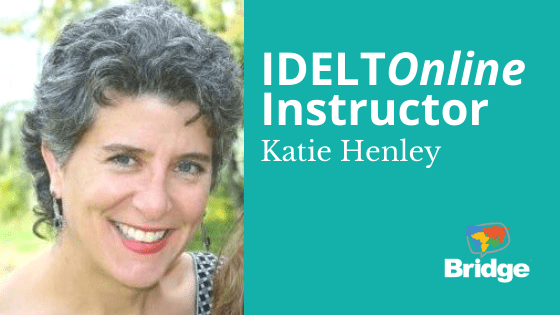A seasoned English teacher and Bridge tutor with a Master’s in TESOL, Katie Henley is an IDELTOnline™ instructor who has leveraged her own language learning experience to help trainees achieve their goals. She discusses the path she took that led her to teacher training, her interactions with students worldwide, and her tips for how trainees can succeed in the IDELTOnline™ program.
Hi, Katie! What inspired you to get into the English language teaching field?
I’ve loved languages since I was a little kid. Though I grew up in an English-speaking household, my grandparents spoke Japanese. So, when I got to visit them, I was just fascinated and excited to hear another language. I started taking foreign languages as soon as I could in my school system, which happened to be high school. It was just my love of languages that encouraged me to teach English.
How has learning these other languages helped you as a teacher?
Knowing several languages (to varying degrees of ability) has made me more empathetic to my own students and the difficulty of learning another language. It also gives me some insight into strategies and techniques that may help my students inside and outside of the classroom as well because I’ve probably tried them first!
How did you choose to become an IDELTOnline™ instructor?
I have been a tutor with Bridge for 20 years, and most of my interactions with my trainees have been asynchronous, meaning we interact primarily through email and in messages and assignments/comments sent through the course platform. When I was offered the opportunity to have more real-time interactions with my students through the IDELTOnline™ course and to build more of a community space, I was excited.
Here are 7 ways the IDELTOnline™ sets you apart when applying to competitive TEFL jobs.
How has your extensive experience in English teaching helped you as a teacher trainer?
I mostly draw on my failures and shortcomings. Those come more quickly to mind than my successes, honestly. When you start teaching, there are so many gaps – I didn’t know how to manage a classroom, how to manage students who were upset about their grades, how to teach specific grammar targets, the best ways to motivate students, etc. So, many of these things you don’t really learn until you’re in the classroom. However, wherever I can anticipate these gaps for my teacher trainees, I try to encourage them and provide support to shore these areas up before they face them alone in their own classrooms.
What are students’ primary motivations behind taking the IDELTOnline™?
I have been amazed by the variety of my trainees’ life experiences and motivations. There really is not “one type” of IDELT trainee. My trainees have included public school teachers who want to change their focus to ESL, professionals in other fields who want to transition to teaching, newly retired people who want to volunteer by teaching ESL, early-career professionals who are exploring creative outlets, and even practicing ESL teachers who want a higher TEFL certification.
Ask yourself these questions to see if the IDELTOnline™ is right for you.
What do you like best about teaching the IDELTOnline™?
I really love interacting with so many people from all over the world. It’s not the same as teaching face-to-face though, but the important things are still there. I’m also thrilled knowing that my work is having an immediate impact all over the globe, both for my trainees and for their own students.
How do you manage your workload with so many trainees and courses?
Whew! Well, honestly, it’s a challenge. I typically score, mark, and respond to emails twice a day, six days a week. I don’t have much downtime, but I like to stay busy, so it suits me. I do my first round of grading, commenting, scoring, emails, and material or post-development before breakfast and the last one before bed!
What do you do in your elusive free time?
In my free time, I enjoy traveling, exploring, reading, doing yoga, and sniffing out great new restaurants and cafes.
What are your top tips for IDELTOnline™ students on acing this course?
- Look ahead. Read the syllabus thoroughly and plot out your time availability across the online TEFL course. Be aware that some weeks will require considerably more work than others. Don’t let those sneak up on you. You don’t want to be surprised by an assignment.
- Work ahead. Try to get your weekly work done nearer to the beginning of the week than the end. Start reading right away for each week. You’ll feel less time pressure that way, and you’ll have a good rhythm for the course.
- Have fun! All trainees have something to draw from and to bring to this course. You can learn a lot from your classmates and find meaningful things you have in common with people who may live on the other side of the world from you. Also, making connections from the coursework to your previous learning (and, perhaps, teaching) experiences, whatever they are, can be very invigorating.









